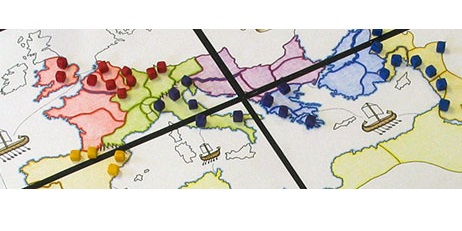
February 23, 2015, by Oliver Thomas
Anything but an essay
Dr Lynn Fotheringham casts an eye over the inventive work currently going on in her Independent Second-Year Project module.
The Independent Second-Year Project, or ISYP, is the Department’s flagship non-traditional assessment module, and a cornerstone of our employability programme. Students choose not only which area of the Classical world they want to explore and how they want to try communicating their knowledge to a non-academic audience. Almost anything except a traditional academic essay is allowable, if the student can explain and justify the idea. The module has been running since the 1990s, and provides preparation both for the Dissertation (in that students define their own topics and seek out their own bibliography) and for life after graduation – and not only if a student decides to explore a potential future career-area such as teaching, working in a museum, publishing, and so on. The focus on communicating to a non-academic audience itself encourages students to think beyond the academy, and in particular prepares them for demonstrating their skills to potential employers in a variety of ways.
As we move into the fourth week of teaching, this year’s ISYP students are mulling over their options before drawing up their final plans at the beginning of March. Ideas range from the career-oriented (like teaching plans or museum-exhibits…) through the artistic (paintings, poetry…) to the ever-popular ‘mash-up’ of ancient information and modern formats (estate agent’s brochures for Pompeiian houses, election pamphlets for Cicero…). The last category can allow students to explore career options such as marketing which might seem to have no explicit connection with Classics.
At the beginning of the semester the students are encouraged to come up with as many ideas as possible. Here are some suggestions overheard at the first seminars over the last two weeks, some of which may become reality by May:
- radio-show covering the debate at Sparta in 432 B.C. on whether to go to war
- marketing campaign for ancient beauty products endorsed by a particular empress
- teaching plan introducing year 6 pupils to ancient Greece
- a series of letters between Roman politicians after the death of Cicero
- brochure for visitors to the Acropolis
- step-by-step guide to making a bust of the emperor Augustus
- paintings of scenes from Greek tragedy
- short story about the great fire of Rome
- information packs for a young Athenian and a young Spartan on their ‘first day at school’
- local magazine from Herculaneum in the period before the eruption of Vesuvius
- model of the façade of a Greek temple for use in a museum display
- board-game based on the life of Nero
- promotional material for an ancient Roman nightclub
- ‘Ancient Olympics’-themed activities for a Scout troop on a camping trip
- using the Rome: Total War game-engine to create video of one of Caesar’s battles
- short story retelling the Oresteia from the perspective of Clytemnestra
- a book of children’s poems focusing on various aspects of Roman daily life
- the story of Alexander the Great through the eyes of the women in his life
- script for a docudrama about the empress Theodora
- a zine presenting lines from Greek lyric poetry next to images that reflect their themes
- scale-model cake based on the temple of Vesta
The last idea has apparently already been rejected, which is a bit sad. I’ll have to do it myself one day!
Image: board-game from a previous round of ISYPs; photo (c) Matt Brooker
No comments yet, fill out a comment to be the first

Leave a Reply